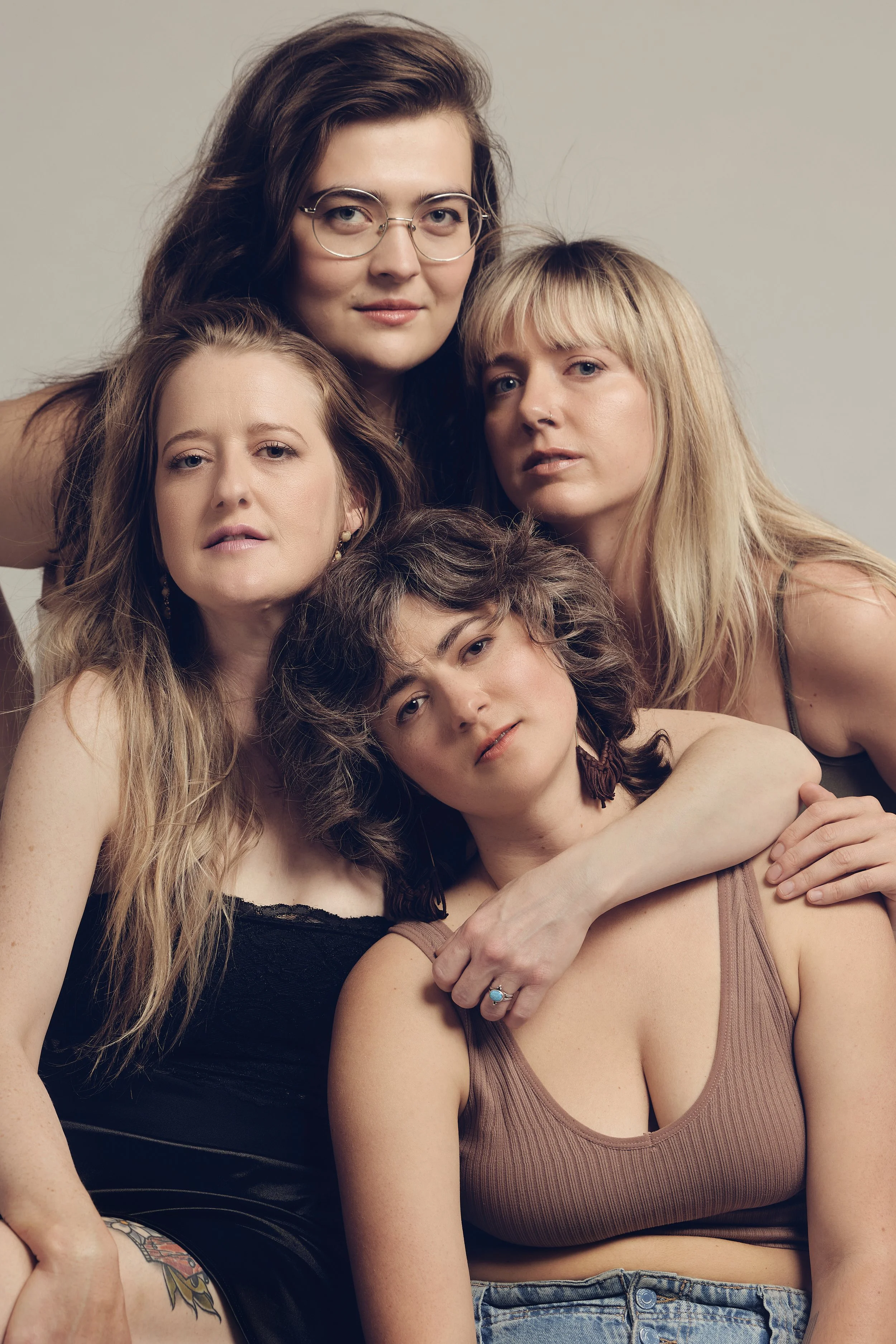Big Richard: Is Not Dicking Around
Photo by: Brian Harrington | Western AF
Written by: Meredith Lawrence
At the end of July, bluegrass supergroup Big Richard emerged onto the Kennedy Center stage dressed in gaudy, skimpy, and sequined outfits and wigs to ape the Founding Fathers. Though they considered cancelling their appearance (as many artists have, in protest of President Trump’s takeover of the storied arts institution), after careful consideration — and nixing the idea of burning the American flag on stage — the group decided to keep their show date. They had something to say.
Photo: Jason Innes
Throughout their set, the four-woman group played protest songs, their own and others’. They closed the raucous night with a triple finale: a haunting, driving rendition of Dave Olney’s, “Millionaire,” followed by Black Sabbath's “War Pigs,” in furious, four-part harmony, and finally, bassist Hazel Royer and fiddler Eve Panning played a dissonant “Star Spangled Banner,” while Bonnie Sims (mandolin) and Joy Adams (cello) made out, voraciously.
“Humor is a powerful tool in that way, in that people — when they're laughing, and you catch them off guard with something that's a little bit funny, or a little bit kookie — they're a little bit more likely to let you in, no matter what they believe, because you just made them laugh,” Sims says. “That is a wildly potent tool for humanity and for my music, and for the way that Big Richard communicates with the audience.”
From the get-go Big Richard toed a line between making kickass music, a chipper, funny stage presence, and something real to say. “It doesn’t piss people off so much,” Sims says. “I'm saying just piss them off a little bit; piss them off the right amount; make them uncomfortable; that's what I want to do.”
“I’m saying just piss them off a little bit; piss them off the right amount; make them uncomfortable; that’s what I want to do.”
Each a seasoned musician in her own right, Big Richard’s members came together in 2021 (Royer joined in Oct. 2023) to mix up a festival bill with too many men on it; but their chemistry was too magic to do just one show, Adams says. Most of the band’s greatest ideas have started as jokes (like the Kennedy Center outfits) and they’ve learned to embrace humor as part of their core ethos. Even the band’s name delivers a wink of innuendo (softened from their original name, Spirit Dicks of the Rocky Mountains). But as Sims points out, innuendo and the laugh are sometimes the point: they keep people interested.
The band’s first studio album, Girl Dinner (named for the band’s many, many gas station dinners on tour), mostly sets jokes aside to tell a set of vast, aching, and utterly fascinating stories. It begins with “So Long My Friend,” a bittersweet farewell that doubles as a declaration of self-worth. Returning throughout the album to bluegrass tropes — hardship, love, loss — but always through a feminist, humanist, and often personal lens, the group tackles, assault, addiction, broken relationships, and comradery delicately but head on.
Photo: Jason Innes
“You found hell on the back steps thinking that those little doves had it made / For a love like that made a life worth living / Even in a cage,” Adams sings on “Back Porch Dove.” Processing a parent’s struggle with alcoholism, Adams imbued the song with nuance earned through her evolving understanding of her mother’s affliction. “It's a picture of people who try really hard in life and things get thrown at them that they're not in control of,” Adams says. “That's how I view my mother these days; she kind of did the best that she could with the tools that she had, and it didn't always end well.”
The entirety of Girl Dinner seems to build toward “The Missing Stair,” its third to last track and the kind of beautifully simple yet biting commentary on a broken society that makes music such an effective cultural force. Sung and co-written by Sims (along with Melody Walker and Phoebe Hunt), the song is a furious, devastating reflection on the way women are socially programed to keep the peace, even in personally dangerous situations. Lurid not for what it says but what it leaves out, the song tiptoes through shadowy corridors and back rooms away from prying eyes:
“Coulda done something / You know I shoulda done more,” Sims sings close to the mic, too close for comfort. “I didn’t see you when you opened up that door / They’re gonna blame you / For breakin’ your bones / They’re gonna call it gravity while casting all their stones.” Not really singing anymore, Sims’ indictment rings clear and cold, before returning to the song’s damning refrain: “Still we whisper, still we warn / ‘Cause we can’t burn down the house where we were born.”
Not without whimsey, Girl Dinner also includes two instrumental fiddle tunes, both written by Panning: “Toas(T) [Girl Dinner at the WaWa],” and “Beards Brushing in the Night,” a love song between Sims and Adams’ DND characters, Thumbstack and Ratley, respectively.
Though the year is 2025, some of the band’s innate radicalism derives simply from their identity as four women comprising the sole members of a successful bluegrass band. “What's crazy to me is that just being four women, playing decently on stage as ourselves, is somehow a protest by itself that will ruffle feathers,” Adams says.
Still, there’s also power in provocation and speaking truth, Sims says, and that is where Big Richard thrives: “We can be whoever we want. We have massive energy, and feminine energy. [Which] speaks to how powerful those things are to say, right now, as a human in the current times.”
Western AF is not currently accepting feature pitches for Western Dispatch. If you simply can’t help yourself you can send it to westernafsubmissions@gmail.com but, really, we aren’t accepting pitches.



